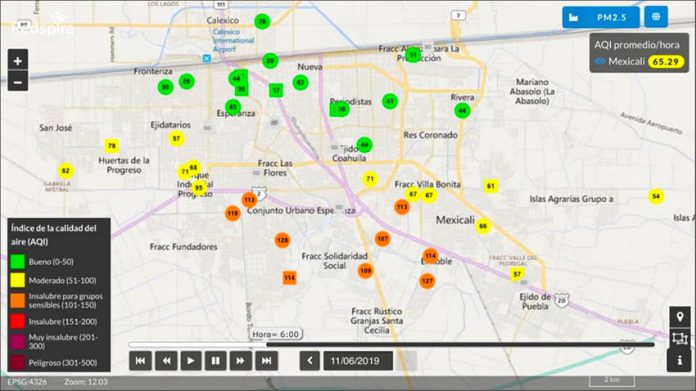Mexicali, Baja California, has an air quality monitoring network thanks to the initiative of a local company and the support of residents, the local government and the state of California.
Called Redspira – a portmanteau of the Spanish words for network (red) and breathe (respirar) – the system is the largest of its kind in Mexico and its measurements can be accessed via a smartphone app and website.
Alberto Mexía Sánchez, director of software, engineering and consulting company Certuit, told the newspaper Reforma that the idea for the project came out of a conversation he had with friends about allergies triggered by contamination in the Baja California capital.
He subsequently put together a team that designed a sensor that measures levels of fine particulate matter in the atmosphere. Each sensor costs around US $350.
After initially making and installing 20 sensors at people’s homes and local businesses, a further 32 sensors donated by the state of California, the Mexicali government and 11 citizens were added to the network.
Mexía explained that the sensors provide a much more economical way to measure air quality compared to traditional monitoring stations, which cost 4 million pesos (US $210,000) to make and install and 500,000 pesos ($26,000) annually to operate and maintain.
A city such as Mexicali requires at least 12 stations to adequately measure air quality, he said.
“That’s 48 million pesos that the Mexicali council isn’t going to invest in technology which doesn’t solve the [air pollution] problem but is used to develop strategies,” Mexía said.
He explained that the air-quality data collected by Redspira is compared with that collected at a traditional monitoring station installed in Mexicali and the results have been similar.
“. . . That validates our data,” Mexía said.
According to statistics from the Baja California Secretariat of Health, there were 715 premature deaths in 2018 linked to air pollution in the state.
More than 30,000 medical consultations were required by people suffering from air contamination-related diseases last year and at least 17 million pesos was spent on the treatment of those illnesses.
Source: Reforma (sp)
